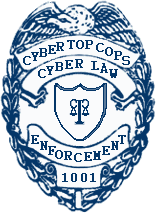419 Scams
Browse the Web with Firefox for protection against spyware, hackers, spoofing and phishing scams
The 419 scam (also known as the Nigerian Four-One-Nine Scam) originated in Nigeria and got its name from a former relevant section of the Nigerian Criminal Code. It normally involves an e-mail informing you about a huge amount of money (that does not exist) that has been deposited somewhere and they cannot touch the money unless they transfer the funds to a foreign account. This is the bait. If you reply to this e-mail, they will know you took the bait and will request that you transfer money to their bank account (they call it an advance fee or transfer fee you have to pay in order to have the money transferred to your bank account). After paying the so-called transfer fee into their bank account, they will continue to ask for more money, every time with a new excuse. You will end up paying loads of money without getting anything in return. The Lottery Scam is another type of Advance Fee Fraud and has the same characteristics of your typical 419 scam.
Most of these scams involve money laundering, bribery and other illegal schemes, which mean you become an accomplice in the illegal activities of the scammers. People conned by these scams normally refrain from reporting it to their local law enforcement authorities out of fear of being prosecuted for fraud. The scammers count on this and use illegal and unethical schemes to make sure you won't go to the cops after being scammed.
Whatever you do never reply to these e-mails in any way! The people behind these e-mails are real life criminals.
The main characteristics of 419 Scams are as follows:
- 419 Swindlers always use a free e-mail address from Yahoo!, MSN (Hotmail), AOL/AIM, Netscape or any other free e-mail service.
- Most of these scams originate from 3rd World countries and you can easily identify it through the badly formatted e-mails, spelling and grammatical errors.
- Swindlers seldom supply any form of proper identification. When they do supply identification details, it is normally fake. They prefer to use names and photos of important, famous people and sometimes they pretend to represent well-known, legitimate organisations.
- There are always huge amounts of money involved (money that does not exist). No financial institution will release the inheritance of someone or any unclaimed funds to a complete stranger at random. Strict procedures are followed when large amounts of money are released to legitimate owners, so why will they relax their regulations for claims from a complete stranger?
- Western Union Money Transfer and MoneyGram are the preferred methods of transferring the funds to the perpetrators. These money transfers are easier to accomplish and leave fewer tracks than electronic fund transfers. It puts the cash directly into the hands of the scammers. Because of this, it is hard to trace the money back to the perpetrators.
- The swindlers are very convincing and play with the minds of their victims. They either pretend to be poor, in jail, sick in hospital or having trouble starting a legitimate business due to law restrictions, trying to make the victim sympathetic to their cause.
- They have a false sense of urgency. There is always a deadline for everything, trying to force their victims into the transaction, preventing them from thinking clearly about the transaction.
- There are most of the times more than one party involved. Fake lawyers, auditors and bank officials are used to confuse the victim even more and to create a false sense of authority and legitimacy. They also use this technique to discourage the victims from reporting the scam to their local police. Cyber crime can only be battled if it is reported. Please report cyber crime.
You can read more about this type of scam on the following pages:
www.joewein.net has comprehensive lists of names, e-mail addresses, IP addresses, ISP's, phone numbers, domains and company names used by 419 scammers.
- Names of people mentioned in 419 spam.
- E-mail addresses used by 419 scammers.
- IP addresses and ISP's (Internet Service Providers) used by 419 scammers.
- Phone numbers used by 419 scammers.
- Domains registered by 419 scammers.
- Company names mentioned in 419 spam.
Below are links to copies of typical 419 scam e-mails. Note that the original formatting of the e-mails were preserved and this is more or less how they look when you open them. We [DELETED] business names, personal names, e-mail addresses and telephone numbers from the examples below for security reasons and because scammers often use different information with each scam e-mail. This is also done to protect the names of individuals and legitimate businesses abused by scammers in these e-mails.
- Annual Global Youth Conference 419 Scam
- Charity Scam
- Classic Nigerian 419 Scam
- Company Representative Scam / Job Offer Scam
- FBI Monitoring Scam
- Inheritance Scam
- Law Enforcement Agency Scam
- Partnership Scam







